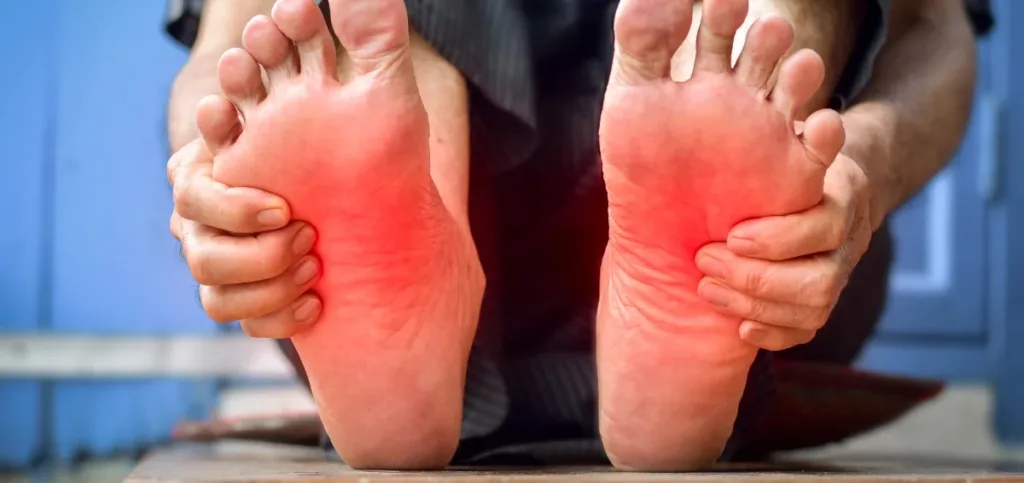
Peripheral neuropathy (PN) affects 2.4% of people worldwide. Closer home, around 20 million Americans suffer from the condition. These people experience persistent discomfort of tingling and numbness in their hands and feet. Neuropathy symptoms aren’t life-threatening. However, they can indicate an underlying condition.
Often, the question of how long I can live with neuropathy looms in the minds of the patients. The concern is valid. Recent studies have shown higher mortality rates for those with PN and other health conditions, such as diabetes. The short answer to this question is that those with mild neuropathy symptoms can expect a normal life expectancy. However, the life expectancy is lower for those with severe symptoms. This is because such symptoms impair the ability to perform daily activities and increase the risk of injuries. This negatively impacts their longevity.
What is Peripheral Neuropathy?
Peripheral neuropathy refers to nerve diseases that impact a part of your nervous system. It can occur due to various conditions. So, the symptoms can be diverse. The peripheral nervous system consists of all the nerves besides those in the central nervous system. PN refers to a condition that affects your peripheral nerves.
We mentioned above that peripheral neuropathy is indicative of a deeper health condition. This is because these peripheral nerves are located farthest from your brain and the spinal cord, which makes up the central nervous system. So, symptoms like persistent tingling and numbness in hands and feet caused by peripheral neuropathy imply the earliest effects of an underlying condition impacting the nervous system.
Patients with PN can showcase any number of symptoms affecting the motor, sensory, and autonomic functions. These include the following:
- Muscle weakness
- Muscle paralysis
- Muscle atrophy
- Uncontrolled muscle movements
- Tingling
- Numbness
- Imbalance
- Pain
- Fluctuations in blood pressure
- Excessive or not enough sweating
- Problems in bowel movement
- Sexual dysfunction
Is Neuropathy Life-Threatening?
Neuropathy itself isn’t life-threatening. The deaths associated with it are majorly due to the severity of the underlying condition that neuropathy symptoms indicate. For example, someone experiencing peripheral neuropathy symptoms due to cardiovascular issues has a lower life expectancy than one with another, less severe, non-chronic condition. So, ultimately, whether or not neuropathy is life-threatening depends on its cause.
What Influences Life Expectancy in People With Neuropathy?

Several factors affect how long you live with neuropathy. These include the following:
Blood Sugar Levels
Neuropathy-related complications are often experienced by those with diabetes. High blood sugar levels damage the small blood vessels that supply blood to the nerves. This halts the flow of nutrients to the nerves, damaging the nerve fibers. If your blood sugar levels are in control, your lifespan with neuropathy will increase. However, poorly managed blood sugar levels will increase mortality risk.
Cardiovascular Issues
Cardiovascular autonomic neuropathy (CAN) is found among diabetics. Autonomic nerves tell the heart to beat more to supply blood optimally to different body parts. In CAN, the heart does not get these signals and, therefore, does not beat appropriately. People with CAN experience neuropathic symptoms like a racing heart, palpitations, fatigue, and exercise intolerance.
Age-related Changes in the Nerve
Older adults are more likely to develop neuropathy. This is because as we age, the nerve fibers degenerate, preventing nerves from functioning well. Decreased blood circulation and blood flow to the nerves cause nerve damage and neuropathic symptoms.
Lifestyle
Lifestyle habits, such as eating a diet high in gluten, sugar, refined grains, and salty food, can worsen neuropathic symptoms. A sedentary lifestyle, with little to no physical activity, reduces blood circulation. Over time, these things can negatively impact your life expectancy with neuropathy.
Also Read: Do You Burn More Calories When Your on Your Period?
Can You Live a Good Life with Neuropathy?

It is possible to live a full life with neuropathy. The secret lies in changing your lifestyle and opting for the right treatment and technologies to alleviate symptoms. Here are some things that will help you.
Nutrition, Exercise, and Stress Management
Lifestyle modifications for people with neuropathy can be divided into nutrition, exercise, and stress management. It is critical to have optimal blood sugar levels, especially if you have diabetes-related neuropathic pain. PN patients should eat a diet consisting of fruits, vegetables, legumes, whole grains, protein, and omega-3-rich foods. Alcohol consumption and smoking should be avoided or strictly limited.
Physical activity is essential to enhance blood circulation. This alleviates symptoms and pain. Ideally, patients should engage in low-impact activities like swimming, walking, and cycling. They promote blood circulation without causing joint stress. Light strength training exercises help maintain muscle strength. This strength improves overall stability.
Excessive stress worsens neuropathic symptoms. Chronic stress triggers the release of cortisol, which prepares the body for the fight-or-flight response. Constant elevation of cortisol worsens neuropathy symptoms. Stress management practices like meditation and deep breathing calm your nervous system and help you relax. Engaging in hobbies or spending time with your loved ones gives you joy, which is good for your overall well-being.
Use the Right Tools for Healthy and Safe Activities
People with neuropathy are more prone to injuries and falls. This exacerbates the condition further. It is important to take the assistance of the right tools to carry out daily activities safely with neuropathy.
To begin with, choose footwear supported by the right orthotic device. They offer more stability and balance. Wearable tools like braces and compression stockings also improve mobility. To perform routine tasks with more independence, use bath mats, install grab bars, and use bath chairs. If you must drive, installing hand controls on your vehicle will be useful.
Medical Treatments to Manage Neuropathic Pain
The management of neuropathic pain has advanced immensely. Various tools are available to help alleviate the symptoms. Serotonin-norepinephrine reuptake inhibitors are commonly prescribed to patients. They enhance the chemicals in the brain that lower incoming pain signals.
Anticonvulsants are another type of drug that reduces nerve signals and helps manage pain.
Another revolutionary treatment for managing neuropathic pain is spinal cord stimulation. Physicians implant a tiny device along the spine of the patient. The device transmits electrical signals to the spinal cord, modifying how the brain responds to pain.
For neuropathic pain in the foot, knee, and hand, dorsal root ganglion stimulation is recommended. It also involves the placement of a device that stimulates the dorsal root ganglia. These are structures along the spinal cord that govern pain signals. Different structures are connected to different body areas. Stimulating a particular structure targets and relieves pain in that specific body part.
Final Thoughts
Neuropathy cannot be completely cured. However, it is not a life-threatening condition. Patients can do various things to manage symptoms and increase their lifespan. Paying attention to the underlying condition that neuropathic symptoms indicate is critical. Noticing them early and seeking medical help can help you live a normal lifespan.










